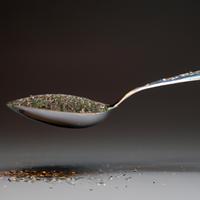
1 serving (12 grams) contains 58 calories, 2.0 grams of protein, 3.7 grams of fat, and 5.0 grams of carbohydrates.

Log this food in SnapCalorie

Nutrition Information
Calories |
1160.0 | ||
|---|---|---|---|
% Daily Value* |
|||
| Total Fat | 74.0 g | 94% | |
| Saturated Fat | 8.0 g | 40% | |
| Polyunsaturated Fat | 0 g | ||
| Cholesterol | 0 mg | 0% | |
| Sodium | 20.0 mg | 0% | |
| Total Carbohydrates | 100.0 g | 36% | |
| Dietary Fiber | 80.0 g | 285% | |
| Sugars | 0 g | ||
| protein | 40.0 g | 80% | |
| Vitamin D | 0 mcg | 0% | |
| Calcium | 1520.0 mg | 116% | |
| Iron | 18 mg | 100% | |
| Potassium | 1160.0 mg | 24% | |
* Percent Daily Values are based on a 2,000 calorie diet. Your daily values may be higher or lower depending on your calorie needs.
Food Attributes
Source of Calories
About Tablespoon of chia seeds
A tablespoon of chia seeds is a powerhouse of nutrients, rooted in ancient Mesoamerican cuisine where they were treasured for their energy-boosting properties. These tiny seeds are high in dietary fiber, providing digestive support, and a natural source of omega-3 fatty acids, which promote heart health and brain function. Packed with plant-based protein, calcium, magnesium, and antioxidants, chia seeds contribute to strong bones and cellular health. Despite their small size, they absorb liquid, creating a gel-like texture that can aid in satiety and hydration. Low in calories yet nutrient-dense, they are versatile and can be added to smoothies, oatmeal, salads, or baked goods. While chia seeds are generally considered healthy, consuming them in excess may lead to digestive discomfort due to their high fiber content. Overall, chia seeds are a nutrient-rich ingredient that complements a balanced diet with minimal risks when enjoyed in moderation.



